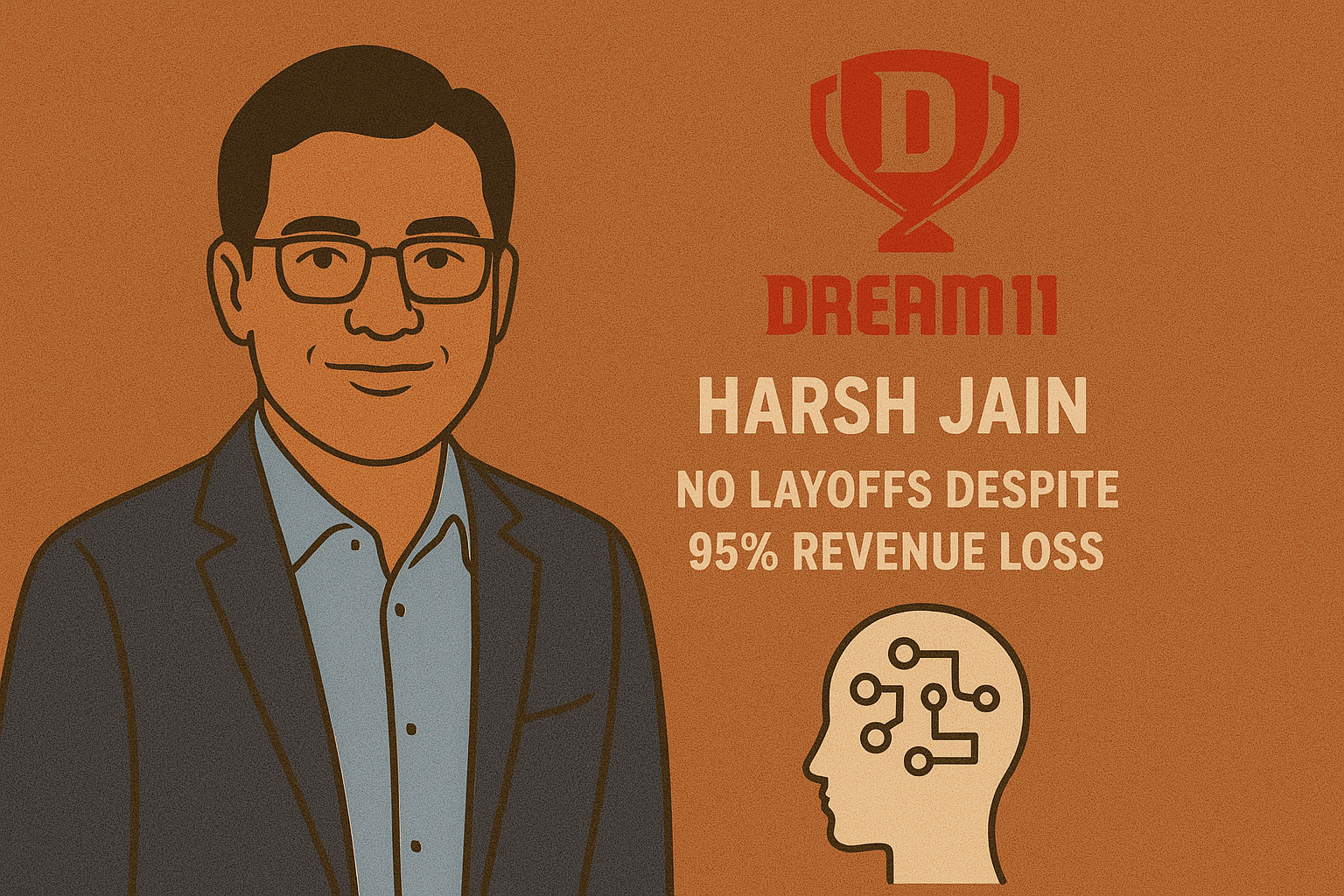
Dream11 CEO Harsh Jain: No Layoffs Despite 95% Revenue Loss, Focus on AI & Sports-Tech
In business, storms reveal a company’s character more than sunshine ever can. Dream11, once the poster child of India’s fantasy sports boom, finds itself in the middle of one of its toughest storms yet. A sweeping ban on real-money gaming (RMG) in India has wiped out nearly 95% of its revenues — an existential blow by any measure. For most firms, such a shock would trigger the corporate playbook of panic: layoffs, hiring freezes, and survival mode. But Harsh Jain, co-founder of Dream Sports, parent of Dream11, has chosen a different path — betting on people over panic.
“If we ever have to start laying off talent, that would be the day we should consider shutting down,” Jain said recently, underlining a conviction rarely seen in India’s startup ecosystem. His message is simple: while revenues may vanish overnight, the true currency of resilience is talent.
A Sector in Turmoil
To understand the gravity of this decision, one must first look at the scale of disruption. The RMG industry in India was valued at over ₹30,000 crore, employing nearly two lakh people. Platforms like Dream11 were not just businesses; they were cultural phenomena, stitching together cricket, technology, and aspiration into a uniquely Indian story.
The ban in Parliament has now dismantled this narrative. Overnight, the largest fantasy sports operator in the country saw its business model upended. For competitors like Winzo, the answer was blunt — shutting down RMG operations in India and pivoting to the US market. Dream11, however, chose to stay and fight, not by holding on to the past but by reinventing the future.
Dream11 3.0: A Pivot to Possibility
Jain calls this reinvention Dream11 3.0. At its core, the model shifts away from dependence on real-money gaming and toward new frontiers: free-to-play formats, artificial intelligence, sports content, commerce, and fan engagement. The company’s 1,000-strong workforce, including over 500 engineers, is being redeployed into these initiatives.
The strategy is not about survival alone. By investing in AI, sports-tech platforms, and digital fan experiences, Dream11 is planting seeds for a larger play — building the infrastructure of India’s next sports economy. Its portfolio — FanCode (sports content), DreamSetGo (sports travel), DreamCricket (grassroots initiatives), and DreamMoney (fintech experiments) — now takes center stage.
This approach is not without risks. Advertising and sponsorships — the new engines of monetization — are notoriously fickle. Global expansion will require navigating competitive landscapes where fantasy sports giants already exist. Yet Jain’s conviction lies in doubling down on the one advantage competitors cannot replicate easily: his people.
Cutting Costs Without Cutting People
It is worth noting that Jain’s resolve is not rooted in denial. Dream11 is cutting discretionary spending, especially on marketing and partnerships. In an industry known for blitzkrieg ad campaigns and high-profile endorsements, this signals a pragmatic shift. Costs are being trimmed, but jobs are not.
This philosophy reflects a deeper belief: a workforce that feels secure will innovate more courageously than one living in fear of pink slips. In a sector where brainpower and creativity are the ultimate raw materials, this is both a moral and economic choice.
Lessons for Corporate India
Dream11’s response to crisis offers a few lessons for Corporate India. First, resilience is less about weathering storms and more about reimagining business models in their midst. Second, talent is not just a cost line in the P&L; it is the engine that creates the next S-curve of growth. And third, leadership is tested less in good times and more in how it navigates adversity.
In choosing not to lay off people, Jain has elevated a management decision into a cultural statement. It signals to his employees, investors, and even regulators that Dream11 is not just an app or a company — it is a team betting on the long-term rise of sports and technology in India.
Betting on the Future
Crises often shrink ambition, but sometimes they expand it. Dream11’s pivot is not just about survival; it is about rewriting its role in India’s sports-tech ecosystem. By refusing to let go of talent, Jain is making a larger point: business models may expire, but the people who build them can always invent new ones.
As Dream11 transitions into its 3.0 phase, the company is taking a bet that may prove more radical than any fantasy league: that in the end, talent compounds faster than capital.


